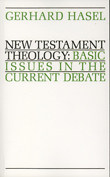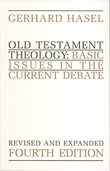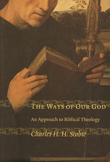Biblical Theology Set (3 vols.)
Digital Logos Edition
Overview
To acquire a comprehensive biblical theology is not easy for the student or scholar in light of the myriad of interpretations, ideas, and discussions surrounding the nature and scope of the Old and New Testaments. Drs. Hasel and Scobie offer excellent solutions to the problem. While providing a thorough survey of the pertinent literature of many leading scholars, Hasel suggests several basic proposals for studying theology with an historical and theological method which seeks to be faithful to the biblical material. Scobie offers a unified approach to Scripture that encompasses the entire sweep of divine revelation, uniting the Old and New Testaments with themes that connect God to the history of His people.

- Discusses issues on various methods of studying Scripture
- Examines themes that unify the Old and New Testaments
- Ideal for students
In this bold and impressive book Charles Scobie has accomplished what many biblical scholars would regard as virtually impossible. Working with a framework of promise and fulfillment and taking a thematic approach, Scobie has produced a unified biblical theology—that is, a truly integrated theology of both Old and New Testament. Encyclopedic in its coverage, fully conversant with scholarship, sensitive in its treatment of the issues, and evangelical in perspective, Scobie’s brilliant synthesis brings the whole of the Bible back to the church. Here is a book that is not only informative but also edifying. A magnificent accomplishment.
—Donald A. Hagner, Fuller Theological Seminary
Charles Scobie offers a remarkably clear and nontechnical account of the theology of the Bible as a whole in its canonical form. It is comprehensive and orderly, more concerned to set out the teaching and implications of the text than to engage in critical investigations of what lies behind the text, and aiming to provide the church with a basis for the development of its own systematic theology. At a time when the compartmentalization of biblical and theological studies is being increasingly deprecated, it is good to have an author who is so knowledgeable in both the Old Testament and the New Testament and able to produce such an attractive synthesis of their teaching, demonstrating that they do indeed belong together as witness to God’s ongoing revelation and redeeming work.
—I. Howard Marshall, University of Aberdeen
Breathtaking in its scope and audacious in its execution, Charles Scobie’s book tackles with erudition and clarity a task that, for a couple of generations now, scholars have thought impossible. Scobie demonstrates convincingly that biblical theology can be done intelligently and can illuminate the life and practice of the Christian church.
—Peter Richardson, University of Toronto
- Title: Biblical Theology Set
- Publisher: Eerdmans
- Volumes: 3
- Pages: 1,554

New Testament Theology: Basic Issues in the Current Debate
- Author: Gerhard F. Hasel
- Publisher: Eerdmans
- Publication Date: 1978
- Pages: 254
Theologians have discoursed over and offered various interpretations on the nature, function, method and scope of New Testament theology. Many of these approaches have resulted in tension and confusion amongst scholars and students. Gerhard Hasel addresses this situation with an in-depth discussion of the basic issues of the debate. Beginning with a comprehensive survey of the emergence and development of New Testament theology over the last two centuries, he examines numerous issues which have led to the present state of crisis in this area. Hasel examines the issues related to methodology, to the unity of the New Testament, and to the relationship between the New and the Old Testaments. He concludes with some basic proposals for doing theology with an historical and theological method which seeks to be faithful to the biblical material. George Ladd, from Fuller Theological Seminary, says of Hasel’s book: “As a prolegomena to New Testament theology, this book has no peers.”
Gerhard Hasel (1935-1994) was Professor of Old Testament and Biblical Theology at Andrews University. He is the author of Jonah, Messenger of the Eleventh Hour and Covenant in Blood.

Old Testament Theology: Basic Issues in the Current Debate
- Author: Gerhard F. Hasel
- Publisher: Eerdmans
- Publication Date: 1972, 1991
- Pages: 262
In answer to the various approaches to the study of Old Testament theology, Hasel provides a comprehensive survey of the pertinent literature of Protestant, Roman Catholic, and Jewish scholars, and in doing so casts fresh light on this important subject. Based on his critical analysis of past and current methods, Hasel offers a new approach for doing Old Testament theology, a methodology that grows out of the nature of the biblical materials.
In this edition Hasel expands his treatment of topics covered in earlier editions, adding material to nearly every chapter. This thorough updating and revision is reflected in the much larger bibliography, which is one of the most thorough bibliographies of Old Testament theology ever published.

The Ways of Our God: An Approach to Biblical Theology
- Author: Charles H. H. Scobie
- Publisher: Eerdmans
- Publication Date: 2003
- Pages: 1,038
Trained in the theories and techniques of academic biblical scholarship, Dr. Scobie has created a magnum opus on biblical theology. Bridging the gap between Old and New Testament studies and between academia and the Christian community, Scobie offers a unified, scholarly, and relevant approach to Scripture that encompasses the entire sweep of divine revelation, making every effort to let the canonical text of the Bible speak for itself. He uses a four-fold pattern for connecting the two testaments into a comprehensive theology: proclamation/promise (Hebrew Bible) and fulfillment/consummation (New Testament). Within this pattern, he sees several biblical themes—God’s Order, God’s Servant, God’s People, and God’s Way. From his years of study and preaching, Scobie offers his own theological reflections on such subjects as holy war, the divinity of Christ, blasphemy against the Holy Spirit, and church councils.
Charles Scobie is Cowan Professor Emeritus of Religious Studies and former head of the Department of Religious Studies at Mount Allison University, Sackvill, New Brunswick, Canada. Among his other books are John the Baptist and No Ordinary Book. He is a contributor to the New Dictionary of Biblical Theology.
Reviews
8 ratings

Josh Watford
10/7/2021


Nicusor Curteanu
11/4/2016
Dennis Pulley
10/9/2014
David pauley
8/30/2014

Kenny Burchard
11/23/2013
Willie Parker
8/29/2013
W Russell Lyle III
8/6/2013
Tin
7/18/2013